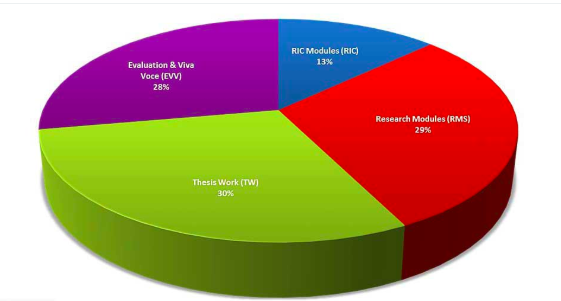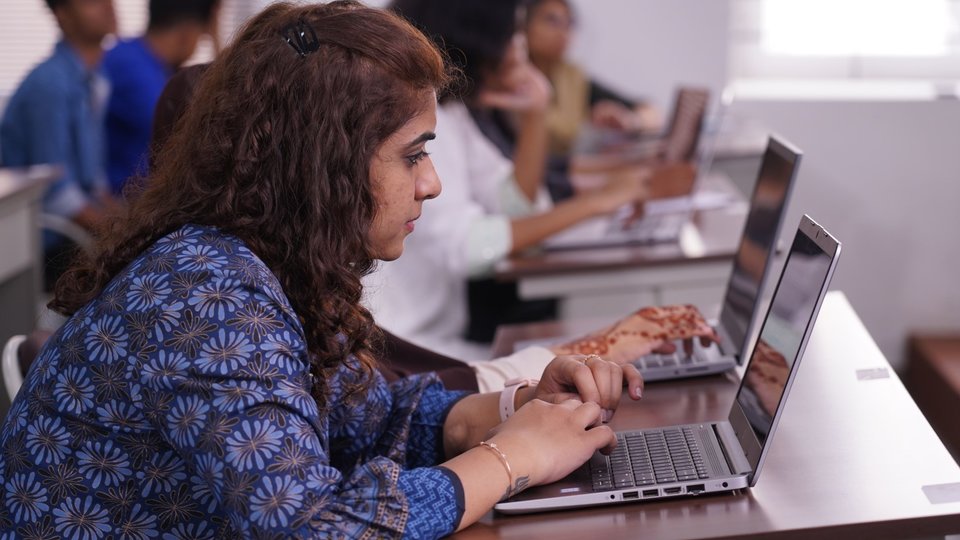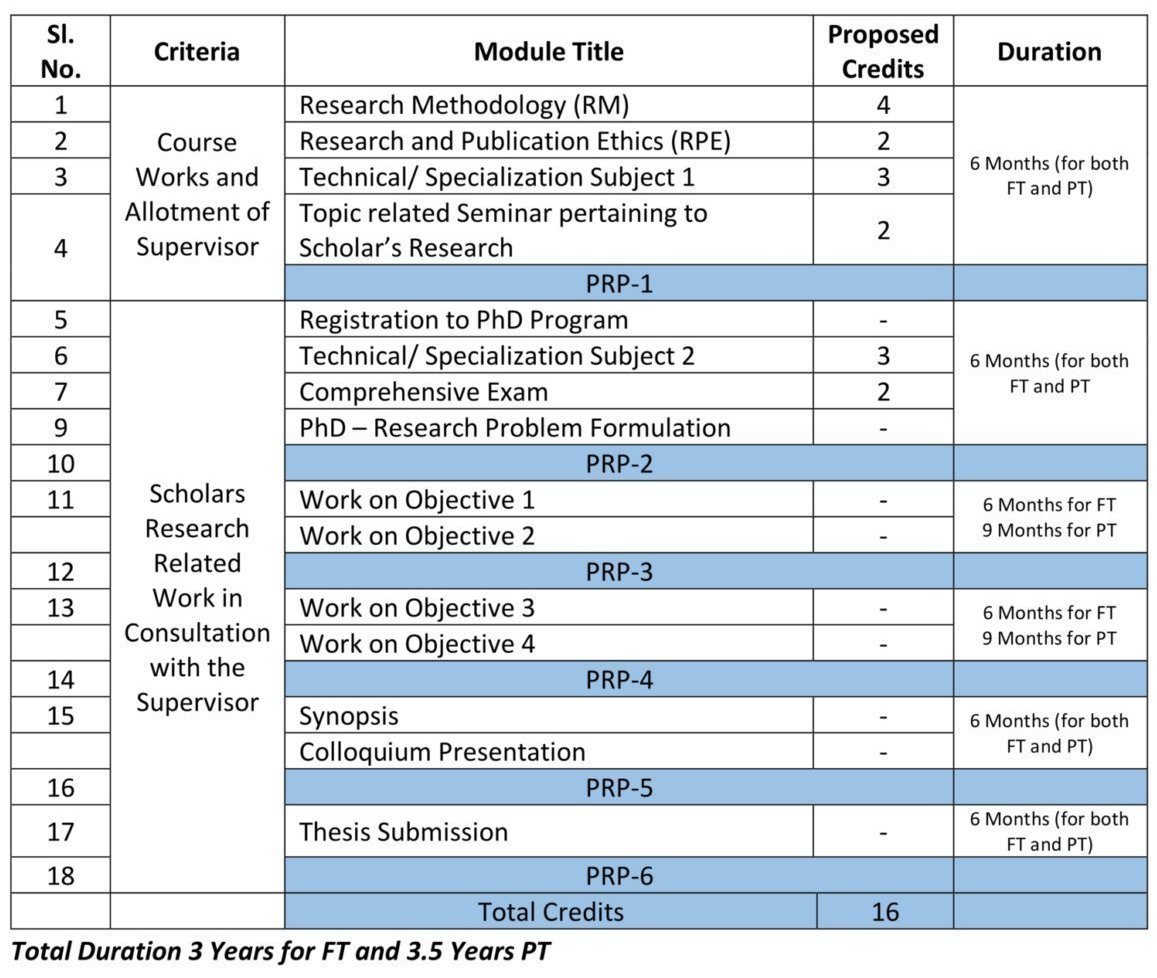Doctor of Philosophy (PhD)
On this page
Overview
Thrust Areas
- Faculty of Engineering & Technology
- Faculty of Art and Design
- Faculty of Mathematical & Physical Sciences
- Faculty of Dental Sciences
- Faculty of Pharmacy
- Faculty of Hospitality Management & Catering Technology
- Faculty of Life and Allied Health Sciences
- Faculty of Management & Commerce
- School of Social Sciences
- School of Law
Objective
To produce researchers who can contribute to society by advancing theory and practice in Science, Engineering, Health, Humanities, and Business
To encourage creativity, analytical thinking, critical analysis, and innovative problem-solving
To develop within each candidate the expertise and skills necessary to be an effective educator and faculty member
To produce graduates with advanced capabilities in leadership and in managing change
Highlights
Education at the Ramaiah University of Applied Sciences is designed to effortlessly bridge the gap between industry and academics. Our programmes therefore -
Are rooted in the application-based learnings of the day
Offer exciting national and international learning and research opportunities
Incorporates comprehensive industry training through internships and placement support
Ensures value addition through guest lectures and workshops by industry experts
Provide state-of-the-art facilities across Faculties to ensure learning by doing
With 9 Faculties from different areas of study, multidisciplinary thinking is a way of life at RUAS.
From a host of eateries and cafes to convenience stores and coffee vending machines, our campuses have been designed and developed to ensure that the needs of every student are met.
Students of our academic research programmes are encouraged to take advantage of the available sponsored research opportunities
The University offers a range of on-campus accommodation options. Third party, off-campus hostels are also available.
Details
Programme Details
Research Themes
The PhD programme is offered by 10 Faculties/Schools of the University.
Experienced faculty members with in-depth knowledge of their subject matter are appointed as supervisors.
In multidisciplinary research areas, decisions about the subject area of research related to entry-level qualification can be referred to a select committee of respective Deans and PVCs.
High Priority R&D Domains
- Artificial Intelligence, Machine Learning and Data Sciences
- Bio, Nano and Composite Materials
- Biotechnology, Food Technology and Public Health
- Business Analytics and Digital Transformation
- Business and Commercial Law
- Composite Structures
- Computational Mechanics and Sciences
- Drug Design and Discovery Technologies
- Health, Ethics and law
- Higher Education
- Public Sector Reforms
- International Politics and Diplomacy
PhD is offered by:
Faculty of Engineering and Technology
Faculty of Art and Design
Faculty of Mathematical and Physical Sciences
Faculty of Pharmacy
Faculty of Dental Sciences
Faculty of Commerce and Management
Faculty of Hospitality Management and Catering Technology
Faculty of Life and Allied Health Sciences
School of Social Sciences
School of Law
Thrust Areas of Research
| Faculty | Themes |
|---|---|
| Faculty of Engineering & Technology | Artificial Intelligence, Data Sciences, Computational Mechanics and Sciences, Composite Structures, Bio Nano and Composite Materials, Civil, Computer Science, Communication, Electrical, Electronics, Medical Image Processing, Machine Learning Techniques, Bio-signal Processing, Biomedical Instrumentation, Nano Biomaterials for Bone Tissue Engineering, Sensors and sensor networking for biomedical applications, Image and Video processing, Cognitive Neuro-science, Image Processing, Photonics, Mechanical, Manufacturing, Material Science, Automotive, Aerospace, Turbo machine, Heat Transfer, Robotics, Plastics and Composites |
| Faculty of Mathematical and Physical Sciences | Chemistry, Polymer Composites, Nano composites, Wastewater Treatment, Medicinal Chemistry, Environmental Chemistry, Mathematics, Machine Learning Equations, Remedial Mathematics, Differential Geometry, Physics, Nonlinear Optics, Laser Spectroscopy, Optoelectronics, Cobaltite’s, Multiferroics |
| Faculty of Pharmacy | Pharmaceutics, Pharmacology, Pharmaceutical Quality Assurance, Pharmaceutical Technology, Pharmacognosy, Pharmaceutical Chemistry, Pharmaceutical Analysis, Pharmacy Practice, Herbal Drug Technology, Drug Design and Discovery Technologies |
| Faculty of Dental Sciences | Oral Medicine and Radiology, Oral and Maxillofacial Surgery, Periodontics, Conservative Dentistry and Endodontic, Orthodontics and Dentofacial Orthopedics, Oral Pathology and Microbiology, Prosthodontics, Crown and Bridge, Public Health Dentistry, Pedodontics and Preventive Dentistr |
| Faulty of Management & Commerce | Operations Management, Finance, Human Resource Management, Marketing, Banking and Insurance, Security Analysis, Managerial Economics, International Finance Management, Investment Banking |
| Faculty of Art & Design | Product Design, Fashion Design |
| Faculty of Hospitality Management and Catering Technology | Hospitality Operations/Management, Tourism Operations/Management |
| Faculty of Life and Allied Health Sciences | Public Health, Food Processing and Preservation Technologies (Bio preservation, Food Processing), Food Nutrition and Biochemistry (Metabolomics, Phytochemistry, Malnutrition), Biotechnology (Cancer Biology, Cell Biology, Molecular Biology, Glycobiology) Ayurveda/Integrative Medicine |
| School of Social Sciences | Sustainable Development, Gender Studies, Higher Education, Governance and Public Policy, Disaster Management, Public Sector Reforms and Public Private Partnerships (PPP), Democracy and State, International Relations and Politics |
| School of Law | Business and Commercial Law; Health, Ethics and Law, Cyber and Information Technology Law; Human Rights and Law; Public Policy and Law, Intellectual Property Laws |
Program Structure

ML: Module Leader
PRP: Progress Review Panel (refer to subsection on Committees)
Please note: 1 credit = 15 hours of study/research work
Programme Structure 2021 Batch Onwards
Research Facilities and Scholar’s Care
The University provides research scholars with:
- A Research Supervisory team
- A cubicle with the necessary computing facility
- Access to Internet
- Access to University Libraries as well as Journals, Laboratories, and Workshops
- Space to set up their Experimental Facility
- Access to Reprographic Facilities
- Support to access other Libraries, Professors, Advisors, and Organizations
- Any other facilities that are essential and within the reach of the University
- Accommodation in the University Campus on payment of the requisite fee (if requested and available)
Teaching and Assessment
15 hours of study/research work is equivalent to one credit. At the time of submission of the thesis, a scholar must have secured at least 330 credits as per the credit accumulation sheet and must have passed PRP reviews 1 to 6.
Getting Started on the Program
- Allotment of Main Supervisor
- Allotment of Co-Supervisor
- Allotment of Advisor
- Formulation and Submission of Problem Statement
Progress Review Panel (PRP)
For each Research Scholar, the PRP is constituted as follows:
- One independent Chair approved by the PVC (Research), knowledgeable in the rules and regulations of the MS (By Research) programme of the University
- Two Examiners approved by the PVC (Research), who are reasonably conversant with the research area of the Scholar
- Supervisor(s) of the Research Scholar (one of the Supervisors will be designated as the Main Supervisor)
Convening the PRP is the responsibility of the Main Supervisor. On completion of the review, the Main Supervisor will forward the PRP report to the Office of the PVC.
Key Skill Development
- Ability to apply knowledge of Mathematics, Science, Engineering, Health, Humanities, and Business to solve complex problems
- Ability to analyse problems, interpret data, and arrive at meaningful conclusions involving critical inferences
- Ability to design a system, component, or process to meet desired needs considering public health and safety, and the cultural, societal, and environmental considerations
- Ability to understand the effect of optimal solutions on legal, cultural, social, and public health and safety aspects
- Ability to develop sustainable solutions and understand their effect on society and environment
- Ability to work as a member of a team, to plan and integrate knowledge of various engineering disciplines, and to lead teams in multidisciplinary settings
- Ability to adapt to the changes and advancements in technology and to engage in independent and life-long learning
Selection Process
Entrance Test (RRPET)
- Tests/Questions may be a mixture of multiple choice and fill-in-the-blanks type
- The use of a calculator is permitted.
- The written examination is 1 hour long. It has 60 marks and consists of 60 questions.
Interview Procedure
- Candidates will be asked to make a presentation outlining their interests and abilities for about 15 minutes. The format for the presentation can be downloaded from the website www.msruas.ac.in. The presentation will be followed by a question and answer session for a duration of about 10 minutes. In addition, every applicant shall under go basics review where the line of questioning will be on UG and PG specialisation along with peripheral knowledge.
- Each candidate will be evaluated on the basis of their oral presentation skills and basics review, ability to articulate complex ideas, how they respond to hypothetical scenarios that may be posed or other appropriate methods that assess their research and analytical potential.
Merit List
A final merit list will be drawn based on:
- Performance in the written test
- Interview
- Academic Performance (Masters and Undergraduate)
The decision of the RIC will be final in the selection of candidates for all PhD programme.
Admissions
Eligibility
A candidate seeking admission to the PhD programme should have obtained at least 60% in a Master’s Degree in the subject area of research he/she intends to pursue. In addition, the candidate will also be required to secure the minimum, stipulated score in the written test and/or interview (Topic Presentation and Basics Review) that may be specified by the RIC of the University.
Application Process
The number of seats available for admission to the PhD Programme will be decided based on the number of Supervisors available and the number of vacancies available under each supervisor.
Selection for admission to the PhD programme will be through a written test followed by an interview as described below. The relative weightages (see Merit List below) for the written test, interview and the previous academic performance, taken together, shall form the basis for preparing the merit list of eligible candidates.
Selected candidates shall fulfill all admission formalities within the prescribed date including paying the fee and completing all admission formalities as notified by the university. Failure to do so will result in cancellation of selection.
Application Fee — Rs. 1,800 (Non-Refundable)
above mentioned fee can be paid online
Fees & Scholarships
For Indian Nationals: Rs. 1,50,000 per annum + 40,000 University Fee
Eligibility
Candidates should have a Master’s degree qualification recognized by the Association of Indian Universities in the related discipline or equivalent. They must also have proof of proficiency in English. For candidates with a Master’s degree programme with English as a medium of instruction, proof of proficiency in English is not required. However, the RIC may, from time to time, specify certain additional guidelines applicable exclusively to research students from foreign countries.
Application Process
Intake Capacity
A faculty member with a Ph.D. degree is eligible to supervise (or co-supervise) a PhD Scholar. A Supervisor should not have more than 6 PhD Scholars at any given time either as a Supervisor or as a co-supervisor. During the period between a Scholar’s registration and their thesis submission, a Scholar is considered to be conducting research under the Supervisor(s) guidance.
Candidates are admitted to the PhD Programme twice a year. On both occasions, the number of seats available for admission to the PhDProgramme will be decided based on the distribution of applicants and availability of Supervisors.
Fees & Scholarships
For International Students/NRIs: USD 3,500 per annum + 40,000 University Fee
Downloads
- Ph.D. Programme - Process Flow pdf | 112.5 KB
- Ph.D. Regulations 2023-24 pdf | 33.4 MB
- Ph.D. Regulations for Batches 2020-21 Onwards pdf | 757.1 KB
- Ph.D. Regulations for Batches 2014-15 to 2019-20 pdf | 868.9 KB
- PhD Programme Specification Batches 2014-15 to 2019-20 pdf | 851.8 KB
- PhD Programme Course Specifications - 2021 Onwards pdf | 1.7 MB
- PhD Formats compressed | 4.9 MB


